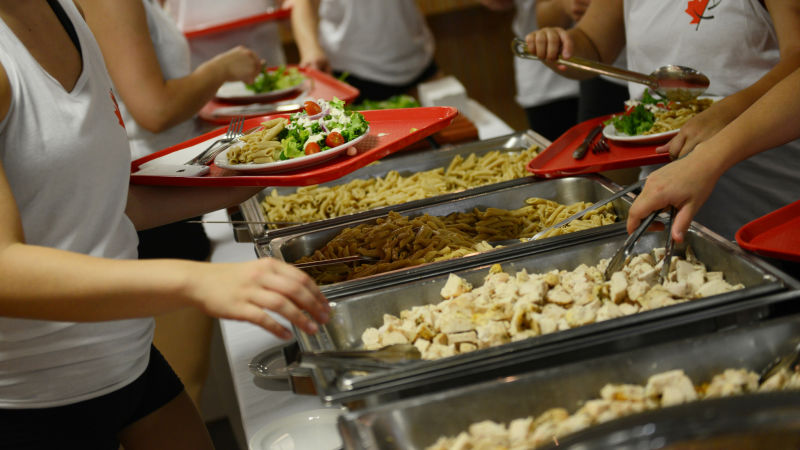Healthy living goes beyond exercising
There is a saying about the fear of the “freshman 15” which implies that students entering college will most likely gain the average of 15 pounds or more throughout the course of their college career. However, there are many ways to avoid the path of an unhealthy eating style.
It is so easy to buy that bag of chips or get all 12 of those easy to make soups. Many of these foods can affect the health of college students leading to obesity or other health complications.
Kirsta Bezenek, a Health Education Specialist at the NMSU Health & Wellness-WAVE Center, gave some insight of ways college students can eat healthy and the factors that tie with bad food habits.
Bezenek says, “Many new college students, and college students in general, experience freedom when it comes to options regarding food and eating habits overall. The freedom can make it difficult for some to develop consistently healthy habits to carry with them throughout their college career and beyond.”
New students may not be financially stable to buy the healthy food and get proper nutrition. Bezenek sees income as a probable cause for unhealthy eating choices.
“Money can be a factor when it comes to eating habits as well as how much time students have to prep meals and/or to grab and eat throughout their busy days of juggling studying, work, sports, friends, etc.” said Bezenek.
It can be overwhelming and exciting for students to come from single-meal focuses at home growing up to an entire cafeteria full of endless food choices.
Students entering college relied heavily on the home cooked meals provided by a family members or what was available. Not many 17 or 18 year olds paid for groceries and know how to set up a weekly meal plan when living with their parents or guardians.
High schools provide breakfast and lunches created with a stable balance of what is required on the food pyramid. It is understandable that when 18 or 19 year adults now, don’t have the same eating habits as once did while depending on an adult. Now that may not be the case for all students, but the majority lived at home and made home cooked meals.
There is a rising trend in meal prepping and signing up for gym memberships. Social media has played a role by influencing the youth by promoting more CrossFit games or fitness competitions. Taking a friend to the gym has become more common and analyzing the results.
With the steps of creating a healthy eating style, students are encouraged to get some exercise as well. There is the campus Activity Center that is housed with an indoor track, basketball/volleyball courts, weight room, racquet sports, cardio room, a rock wall, and dance/aerobic studio, along with intramural fields.
According to a study done by the National Health Services, the foods or snacks that college students can buy at an affordable price, range between fruits, vegetables, and dairy that are served at local groceries or markets. The top five affordable snacks highly recommended for students living in the dorms are:
- Apples- Can be purchased for around a dollar a pound, good for the digestive system and can go hand in hand with some peanut butter.
- Bananas- Perfect for on-the-go and are full of vitamins, potassium and fiber with low salt.
- Carrots- Carrots are easy, cheap and packed with nutrition like protein, natural carbohydrates, fiber, calcium and potassium. A mini pack on the go is perfect for snacking between classes!
- Oranges- Other than the obvious vitamin C benefit, you’ll get potassium, calcium, healthy carbohydrates and more vitamins. They are high in sugar, but it’s not as bad as, say, a candy bar. You can get an entire bag of oranges for the same price as an unhealthy bag of chips.
- Peanuts- They’re cheap and chock-full of protein. They’re high in the good kinds of fats and can keep you full longer than snacks made with artificial preservatives.
The more frequently healthy behaviors are practiced, the faster, and more likely, they are to become a habit. Bezenek believes these are the key factors to a healthy lifestyle for college students.
Set yourself up for success: exercise at a time that works for you and a choose a place/type of exercise you find enjoyable, keep healthy foods and beverages on-hand, make balanced meal choices for breakfast/lunch/dinner, get at least 7-9 hours of sleep each night, manage stress, prioritize time.
Bezenek thinks students can practice a healthy lifestyle by consistently making healthy choices early on in their college career. Students can avoid the temptation to eat unhealthy foods by practicing self-control when presented with food choices and by only buying healthy options to keep around their living spaces. She uses the saying to abide by the saying, “out of sight, out of mind”.
More tips for college students to develop a healthy eating style and physical routine.
Don’t Binge-Try to only eat when you’re hungry, not out of boredom or habit while you’re watching Netflix or studying and avoid eating only one meal a day.
Be Prepared-Keep only healthy snacks in your backpack, car, dorm room, kitchen, or general living space.
Develop a Routine-If you have a meal plan at Taos, stick to it for breakfast, lunch, and dinner instead of venturing out to other eating venues on campus.
Stay Quenched-Drink lots of water; carry a refillable bottle throughout the day.
Be Mindful-Take time to think about and to investigate the nutritional value of the foods you’re eating. Practice self-discipline, moderation and variety when it comes to the food groups (fruits, vegetables, grains, dairy, & protein).
It’s also important to have patience in adjusting unhealthy eating habits to healthy ones, nobody is perfect, and it is important to reward yourself every once in a while as long as it’s in moderation.

Gianni Nicole Villegas is entering her 4th year at New Mexico State University and majoring in Secondary Education with an emphasis in history. She is...

